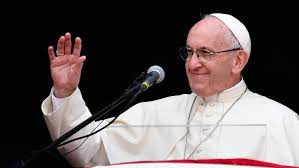
The Vatican is reportedly in turmoil following the discovery of a secret handwritten letter by the late Pope Francis, found in the early hours after his death on Easter Monday. Referred to by insiders as “The Last Confession,” the document allegedly contains a personal message addressed to the world – one that could have profound implications for the future of the Catholic Church.
Sources inside the Vatican confirm the letter was discovered by a junior archivist working in the restricted section of the Apostolic Library. Sealed in an envelope marked “To be read only in the event of my death,” the message is believed to have been written by Pope Francis during his final hospitalization for pneumonia.
While Vatican officials have yet to release the letter publicly, anonymous insiders suggest it may touch on deep theological revelations, internal Church struggles, and even reference a spiritual vision Pope Francis reportedly experienced weeks before his passing.
The letter is currently under review by the Congregation for the Doctrine of the Faith, the department responsible for safeguarding Catholic doctrine. A decision is expected within days on whether the content will be shared with the public or kept confidential within the walls of the Holy See.
News of The Last Confession has spread rapidly across social media, with believers and skeptics alike speculating on its contents. Some claim the Pope may have confessed personal regrets, while others believe he may have issued warnings about future challenges to the Church or even endorsed a new direction for its leadership.
International faith leaders have called for transparency, arguing that Pope Francis’s commitment to humility and openness should be honored in death as it was in life.
“This is not a time for secrecy,” said Father Miguel Fernandez, a Jesuit theologian based in Argentina. “If Pope Francis left behind words for the faithful, we must hear them – even if they make us uncomfortable.”
Pope Francis, born Jorge Mario Bergoglio, made history in 2013 as the first Jesuit, the first Latin American, and the first non-European pope in over a thousand years. His papacy was marked by efforts to reform the Vatican bureaucracy, bridge divisions within the Church, and emphasize compassion over dogma.
His passing at age 88 marks the end of a transformative era. But if the content of The Last Confession aligns with the bold legacy he leaves behind, it may be that his most impactful message was saved for last.
As the world awaits answers, the Church stands at a crossroads – between tradition and truth, secrecy and revelation.